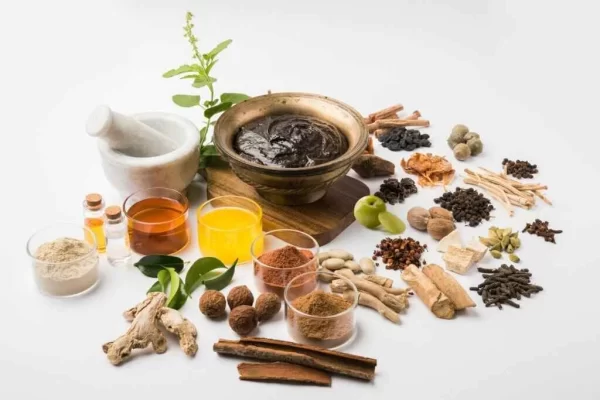Gas and bloating are both common digestive problems that can lead to irritation and shame. A lot of people use natural remedies, like herbal teas to treat the symptoms. Herbal teas have been utilized for centuries to improve general health and well-being Some are particularly efficient in treating digestive issues. This article will look at five herbal teas that can help relieve gas and bloating. Keep reading to get more information on wellhealthorganic.com:5-herbal-teas-you-can-consume-to-get-relief-from-bloating-and-gas.
Also Read: wellhealthorganic.com:diet-for-excellent-skin-care-oil-is-an-essential-ingredient
1. Peppermint Tea
Peppermint is utilized for centuries for traditional remedies to treat different digestive issues, like gas and bloating.
Peppermint Tea and Its Digestive Benefits: wellhealthorganic.com:5-herbal-teas-you-can-consume-to-get-relief-from-bloating-and-gas
The peppermint (Mentha piperita) is a pleasant herb belonging to the mint family. The leaves of the plant contain a variety of active compounds, like menthol that has been proven to provide many benefits for health, especially for digestion.
- Natural Antispasmodic The menthol found in peppermint contains antispasmodic qualities which aid in relaxing the muscles that smooth the digestive tract. This can ease cramping spasms, bloating, and other discomforts that is caused by gas and bloating.
- Carminative properties: Peppermint also has carminative properties, which assist in removing stomach gas out of the tract. It can also help in reducing the feeling of being full and gas after eating.
- Enhances the Digestive function Peppermint tea may increase the production of bile and the release of digestive enzymes, enhancing overall digestion and preventing accumulation of stomach gas and the intestines.
Also Read: wellhealthorganic.com:red-chilli-you-should-know-about-red-chilli-uses-benefits-side-effects
Preparing Peppermint Tea for Bloating and Gas Relief:
The making of peppermint tea can be an easy and straightforward procedure. Follow these steps for making an energizing cup of peppermint tea
- Bring water to a boil: Take a glass of water and bring it to simmer in a pot or kettle.
- Prepare the leaves of peppermint If you are using fresh leaves of peppermint, gentle rinse them and then pat dry prior to using. If dried, take 1 teaspoon.
- The leaves should be soaked: Place the fresh or dried peppermint leaves into cups or teapots. Pour hot water on the leaves and let them infuse for 5-10 minutes.
- Serve and strain: After steeping, strain the tea, removing the leaves. Pour the tea into the cup. You can drink the tea hot or cold depending on what you prefer.
- Make your own tea You can increase the flavor in your tea with peppermint by adding lemon, honey or even a cinnamon stick. But, you should avoid adding sugar as it can contribute to gas and bloating.
Peppermint tea is a tasty and healthy way to fight gas and bloating. Its antispasmodic and carminative qualities help to relax your digestive system as well as prevent the accumulation of gas and boost overall digestion health. The addition of peppermint tea to your daily routine can help alleviate gas and bloating as well as improve the overall health of your digestion. Like all natural remedies it is important to speak with a medical expert before making use of peppermint tea as treatment, especially when you are pregnant, nursing, or are taking medication.
Also Read: wellhealthorganic.com:winter-skin-care-tips-home-remedies-to-keep-your-skin-moisturised
2. Ginger Tea
Ginger, a potent and adaptable root is used for a long time in traditional medicine to treat many ailments including digestive issues.
Ginger Tea and Its Digestive Benefits:
The ginger (Zingiber officinale) is an aromatic and spicy root that is packed with active compounds including shogaols, gingerols, and shogao. These substances provide numerous health benefits, mainly for digestion.
- Naturally Antispasmodic: Ginger has antispasmodic properties that can help relax the smooth muscles of the digestive tract. The relaxation of the gastrointestinal tract can ease cramps spasms, discomfort, and cramps that is caused by gas and bloating.
- Carminative Property: Ginger also has carminative properties that aid in the elimination of stomach gas out of the tract. This may help to alleviate the feeling of fullness and bloating following a meal.
- Improves digestion Ginger tea may assist in the production of digestive enzymes, and help improve the overall digestion. This can help to stop gas accumulation inside the stomach, and the intestines.
Also Read: wellhealthorganic.com:11-health-benefits-and-side-effects-of-olives-benefits-of-olives
Preparing Ginger Tea for Bloating and Gas Relief:
Ginger tea preparation is a straightforward and straightforward procedure. Follow these steps to make an energizing cup of ginger tea
- Water to boil: Bring one cup of water the point of boiling in a kettle or a saucepan.
- Preparing your ginger: If you’re using fresh ginger, cut it in pieces and slice thinly a small piece (about 1-inch) or chop it. If you are using dried ginger powder you can measure about 1-2 teaspoons.
- The ginger should be soaked: Put the raw ginger pieces or dry powder in a cup or teapot. Pour hot water on top of the ginger, and allow it to infuse for 5-10 minutes.
- Serve and strain After the tea has been steeped the tea, strain it through a strainer to get rid of the pieces of ginger or powder. Pour the tea into cups. You can drink the tea hot or cold according to your preferences.
- Make your own tea It is possible to enhance the flavor of your herbal tea with ginger by adding lemon, honey or even a cinnamon stick. Be sure to avoid sugar as it may cause gas and bloating.
Ginger tea is delicious and healthy way to fight gas and bloating. Its antispasmodic and carminative qualities help to relax your digestive system as well as prevent gas buildup and improve overall digestion. Integrating ginger tea into your routine will help relieve gas and bloating as well as improve the overall health of your digestion. Like all natural remedies it is crucial to talk with a medical professional prior to taking ginger tea for treatment particularly if you’re pregnant nursing, taking any medications.
Also Read: How To Know The Causes Of White Hair And Easy Ways To Prevent It Naturally?
3. Fennel Tea
Fennel, a delicious and aromatic plant has been extensively used as a traditional remedy for many illnesses, such as digestive issues.
Fennel Tea and Its Digestive Benefits:
It is believed that Fennel (Foeniculum vulgare) is a flowering plant that is part of the Apiaceae family. The seeds are loaded with active substances, like Anethole. It has numerous health benefits, especially for the digestive system.
- Naturally Antispasmodic Anethole present in fennel is thought to have antispasmodic properties that help to relax the smooth muscles of the digestive tract. The relaxation may ease cramping spasms, bloating, and other discomforts that is caused by gas and bloating.
- Carminative properties:Fennel also has carminative properties that aid in the elimination of gases from your digestive tract. This helps lessen the sensation of being full and constipation after a meal.
- Enhances digestion Fennel tea may aid in stimulating bile production and release digestive enzymes, which can improve the overall digestion process and preventing the buildup of gas within the stomach as well as the intestines.
Also Read: Amazing beauty tips of ice cube will make you beautiful and young
Preparing Fennel Tea for Bloating and Gas Relief:
Making Fennel tea is an easy and simple procedure. Follow these steps to make an inviting beverage of tea made from fennel
- Bring water to a boil: Bring one cup of water boiling in a kettle or a saucepan.
- Prepare the Fennel seeds 1 teaspoon from crushed fennel seeds.
- The seeds should be soaked: Put the seeds of fennel that have been crushed in the teapot or cup. Pour hot water on the seeds and let them sit up to 10 minutes.
- Serve and strain:After steeping, strain the tea to get rid of the seeds. Pour the tea into cups. It is possible to drink the tea hot or cold according to your preferences.
- You can customize your tea It is possible to enhance the flavor of your Fennel tea by adding lemon, honey or cinnamon sticks. Be careful not to add sugar as it can lead to gastric bloating and gas.
Fennel tea is a tasty and natural remedy for gas and bloating. Its antispasmodic, carminative and anti-inflammatory properties help to relax your digestive system as well as prevent gas buildup and improve overall digestion. By incorporating fennel tea in your daily routine can help alleviate gas and bloating, and boost your digestive health. As with all natural remedies it is crucial to speak with a medical professional prior to taking fennel tea as an treatment, particularly in case you are pregnant or nursing, or are taking any medications.
Also Read: Read about the benefits, risks, and ideal amounts of Vitamin E
4. Chamomile Tea
Chamomile tea is an herbal infusion made of dried chamomile flowers. it has been utilized for centuries for its calming properties. This is the the most effective tea for constipation. It also helps relieve gas and bloating thanks to its antispasmodic and anti-inflammatory and carminative effects. This is how it works:
- Antispasmodic effects Chamomile tea can soothe the muscles in the digestive tract by reducing cramping and spasms which can cause gas and bloating.
- anti-inflammatory qualities The tea of Chamomile contains flavonoids, that are anti-inflammatory in nature. Inflammation of the digestive tract can cause gas and bloating, therefore decreasing inflammation can help ease these symptoms.
- Carminative effectChamomile tea is known to have carminative properties that means it assists to eliminate gases from your digestive tract as well as reducing discomfort and bloating.
How do I make and use chamomile tea to help with gas relief and bloating?
- Water to boil:Bring one cup of water and bring it to point of boiling.
- The tea is ready to drink:Place 1-2 teaspoons of dried flowers of chamomile (or the tea bag with chamomile) in the teacup. Pour simmering water onto the flowers and allow them to sit for 5-10 minutes.
- Then, strain and add sweetener (optional):If you are using loose chamomile flower petals then strain the tea to eliminate the flowers. It is possible to sweeten the tea with stevia or honey If you prefer, but be sure to avoid sugar as it can lead to gastric bloating and gas.
- Relax and drink Drink the tea slowly and allow the relaxing effects to take place. It is suggested that you drink the tea chamomile three every day, and especially after meals, to reduce gas and bloating.
Also Read: How to gain weight with raisins:wellhealthorganic.com
Precautions
Although chamomile tea generally considered to be safe but some people might have allergies, especially when they are sensitive to plants belonging to the family of daisies. Women who are breastfeeding or pregnant and those taking blood thinners must consult with their physician prior to drinking the tea. If you want clarification as to whether the tea is safe you should consult your physician.
5. Lemon Balm Tea
Lemon balm tea is an herbal infusion derived using its leaves from the plant of lemon balm (Melissa officinalis) it is a part of the mint family. Lemon is also thought to be an extremely efficient tea to help weight loss. This aromatic herb has been used for ages to calm and improve digestion advantages. The consumption of lemon balm tea could help relieve gas and bloating because of its antispasmodic carminative, and soothing properties.
Here’s how lemon balm tea could aid:
- Antispasmodic effect The tea of lemon balm is a great way to relax the muscles in the gastrointestinal tract by reducing cramps and spasms which can cause gas and bloating.
- Carminative effect Tea made from lemon balm is known to have carminative properties. This means it assists in removing stomach gas out of the tract as well as reducing discomfort and bloating.
- Properties of soothing: The calming effects of lemon balm tea may reduce anxiety and stress that can lead to digestive issues such as gas and bloating.
How do you make and use lemon balm tea to help with gas relief and bloating?
- Bring water to a boil Bring one cup of water to boiling.
- The tea is ready to drink 1 teaspoon of lemon balm leaves that have been dried (or the lemon balm teabag) in the teacup. Pour hot water on top of the leaves, then let it sit over 5-10 mins.
- Then, strain and add sweetener (optional): If you are using lemon balm leaves then strain the tea to get rid of the leaves. The tea can be sweetened with stevia or honey should you wish, but try to stay clear of sugar, as it can lead to gas and bloating.
- Relax and drink: Sip the warm tea slowly, allowing beneficial effects to happen. Lemon balm tea three every day, and especially at the end of meals, is suggested to ease gas and bloating.
Also Read: Wellhealthorganic.com: If you are troubled by snoring then know home remedies to deal with snoring
Precautions
Lemon balm tea is thought to be to be safe, however some people might suffer from allergic reactions or interactions with certain medicines. Women who are pregnant or nursing and those who are taking thyroid medications or sedatives should consult with their medical professional prior to drinking the tea made from lemon balm. If you’re uncertain if this tea would be right for you, speak to your physician. You must know about wellhealthorganic.com:5-herbal-teas-you-can-consume-to-get-relief-from-bloating-and-gas for your convenience.
Read also:



